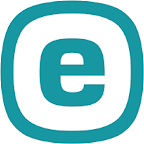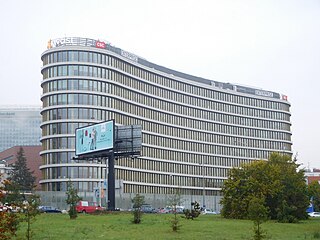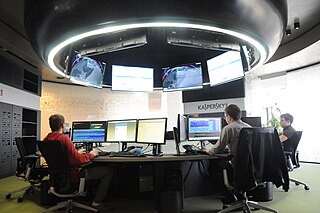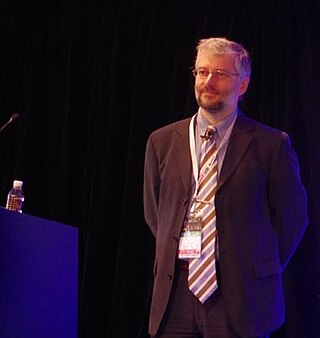Malware is any software intentionally designed to cause disruption to a computer, server, client, or computer network, leak private information, gain unauthorized access to information or systems, deprive access to information, or which unknowingly interferes with the user's computer security and privacy. Researchers tend to classify malware into one or more sub-types.

Antivirus software, also known as anti-malware, is a computer program used to prevent, detect, and remove malware.
The EICAR Anti-Virus Test File or EICAR test file is a computer file that was developed by the European Institute for Computer Antivirus Research (EICAR) and Computer Antivirus Research Organization (CARO) to test the response of computer antivirus (AV) programs. Instead of using real malware, which could cause real damage, this test file allows people to test anti-virus software without having to use a real computer virus.

ESET NOD32 Antivirus, commonly known as NOD32, is an antivirus software package made by the Slovak company ESET. ESET NOD32 Antivirus is sold in two editions, Home Edition and Business Edition. The Business Edition packages add ESET Remote Administrator allowing for server deployment and management, mirroring of threat signature database updates and the ability to install on Microsoft Windows Server operating systems.
Norton AntiVirus is an anti-virus or anti-malware software product founded by Peter Norton, developed and distributed by Symantec since 1990 as part of its Norton family of computer security products. It uses signatures and heuristics to identify viruses. Other features included in it are e-mail spam filtering and phishing protection.

Avast Software s.r.o. is a Czech multinational cybersecurity software company headquartered in Prague, Czech Republic, that researches and develops computer security software, machine learning, and artificial intelligence. Avast had more than 435 million monthly active users and the second largest market share among anti-malware application vendors worldwide as of April 2020. As of 2018, the company had approximately 1,700 employees across its 25 offices worldwide. In July 2021, NortonLifeLock, an American cybersecurity company, announced that it was in talks to merge with Avast Software. In August 2021, Avast's board of directors agreed to an offer of US$8 billion.
CARO is an organization that was established in 1990 to research and study malware.
Rogue security software is a form of malicious software and internet fraud that misleads users into believing there is a virus on their computer and aims to convince them to pay for a fake malware removal tool that actually installs malware on their computer. It is a form of scareware that manipulates users through fear, and a form of ransomware. Rogue security software has been a serious security threat in desktop computing since 2008. An early example that gained infamy was SpySheriff and its clones, such as Nava Shield.

Kaspersky Anti-Virus is a proprietary antivirus program developed by Kaspersky Lab. It is designed to protect users from malware and is primarily designed for computers running Microsoft Windows and macOS, although a version for Linux is available for business consumers.

PC Tools was a software company founded in 2003 and acquired by Symantec in 2008; the new owner eventually discontinued the PC Tools name. Company headquarters were in Australia, with offices in Luxembourg, the United States, United Kingdom, Ireland, and Ukraine. The company had previously developed and distributed security and optimization software for the Mac OS X and Microsoft Windows platforms.

VirusTotal is a website created by the Spanish security company Hispasec Sistemas. Launched in June 2004, it was acquired by Google in September 2012. The company's ownership switched in January 2018 to Chronicle, a subsidiary of Google.

A computer virus is a type of malware that, when executed, replicates itself by modifying other computer programs and inserting its own code into those programs. If this replication succeeds, the affected areas are then said to be "infected" with a computer virus, a metaphor derived from biological viruses.

Comodo Internet Security (CIS) is developed and distributed by Comodo Group, a freemium Internet security suite that includes an antivirus program, personal firewall, sandbox, host-based intrusion prevention system (HIPS) and website filtering.

Malwarebytes Inc. is an American Internet security company that specializes in protecting home computers, smartphones, and companies from malware and other threats. It has offices in Santa Clara, California; Clearwater, Florida; Tallinn, Estonia; Bastia Umbra, Italy; and Cork, Ireland.

Kaspersky Lab is a Russian multinational cybersecurity and anti-virus provider headquartered in Moscow, Russia, and operated by a holding company in the United Kingdom. It was founded in 1997 by Eugene Kaspersky, Natalya Kaspersky and Alexey De-Monderik. Kaspersky Lab develops and sells antivirus, internet security, password management, endpoint security, and other cybersecurity products and services.
Avira Operations GmbH & Co. KG is a German multinational computer security software company mainly known for its Avira Free Security antivirus software. Although founded in 2006, the Avira antivirus application has been under active development since 1986 through its predecessor company H+BEDV Datentechnik GmbH. Since 2021, Avira has been owned by American software company NortonLifeLock, which also operates Norton, Avast and AVG. It was previously owned by investment firm Investcorp.

Mikko Hermanni Hyppönen is a Finnish computer security expert, speaker and author. He is known for the Hyppönen Law about IoT security, which states that whenever an appliance is described as being "smart", it is vulnerable. He works as the Chief Research Officer at WithSecure and as the Principal Research Advisor at F-Secure.
Eddy Willems, is a Belgian computer security expert and author of security blogs and books, active in international computer security organizations and as a speaker at information security-related events.
AV-Comparatives is an Austrian independent organization that tests and assesses antivirus software, regularly releasing charts and reports that are freely available to the public and the media. Antivirus vendors have to meet various requirements regarding trustworthiness and reliability in order to take part in the tests.

Igor Muttik is a computer security expert, researcher and inventor.












